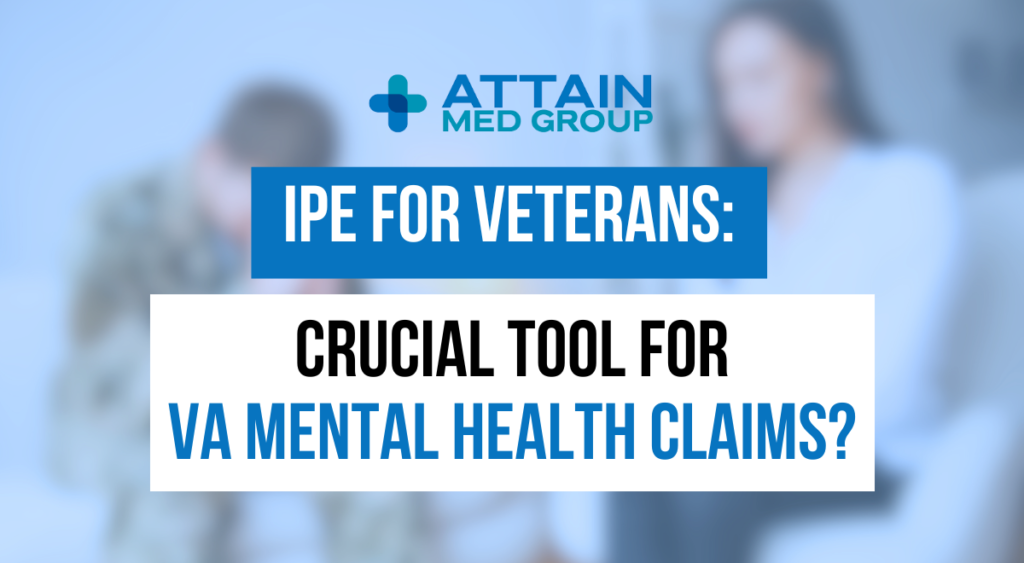Many veterans face mental health challenges related to their military service. An Independent Psychological Evaluation (IPE): What Veterans Need to Know, can be a crucial resource for those seeking VA disability benefits. It’s like having an expert assess all the indicators to determine the true nature of the situation.
An Independent Psychological Evaluation (IPE) offers veterans a significant advantage. This is when pursuing disability benefits from the Veterans Affairs.
Understanding the IPE: A Deep Dive for Veterans
For veterans navigating VA disability claims, Independent Psychological Exams (IPEs) are very important. These evaluations provide an objective perspective on mental health diagnoses connected to military service. IPE’s are conducted by qualified experts who are unfamiliar with the veteran’s case.
These aren’t superficial assessments. Instead, they are in depth and carefully evaluate a veteran’s mental well-being.

The Objectivity Factor in IPEs
Why is objectivity important? IPEs are performed by impartial mental health professionals, unaffiliated with the VA. This enables adjudicators to see a veteran’s condition without the potential for bias sometimes present in standard physician reports.
Independent Psychological Examinations also thoroughly analyze background information. There is no question with the validity.
How IPEs Provide a Comprehensive Look
IPEs offer more than a standard review. The professionals conducting these evaluations engage directly with each veteran.
This enables professionals to understand each veteran’s unique circumstances, such as factors affecting health in combat zones. Practitioners also provide a final report, including treatment recommendations to enhance each veteran’s life.
The Role and Benefits of IPEs in VA Claims
The effectiveness of an IPE lies in its ability to assess both general health and specific mental health disorders. This provides veterans with a way to get the comprehensive care they need.
When you need crucial information, gaining an outside perspective is valuable. Here is IPE’s role and some of the advantages:
Key Components of IPE’s
Several key elements are considered, including an objective assessment. Information regarding the veteran’s mental health is gathered through interviews and reviewing testing data.
Here’s what you can anticipate during your independent evaluation:
- You should be prepared to offer a detailed medical history. This should include both physical and mental health, particularly any experiences during your military service and significant changes after service.
- You might be asked specific questions about your daily functioning, mood variations, behavior, social interactions, and cognitive abilities.
- Participating in psychological testing might be required. Tests like the Minnesota Multiphasic Personality Inventory (MMPI) or the Post-Traumatic Stress Disorder Checklist (PCL) may be used. The aim is to evaluate your psychological state and confirm the intensity of your symptoms.
The goal is to minimize bias, as external professionals, uninvolved with the case, perform each assessment. These experts analyze the veteran’s medical history, service details, and specific experiences, providing a thorough understanding of their health condition.

More on IPE’s
Independent Psychological Examinations significantly influence VA decisions, ensuring accurate diagnosis.
Independent Psychological Evaluation (IPE): What Veterans Need to Know About Accuracy
Imagine a situation where every veteran gets accurate diagnosis based on their specific needs. Independent Psychological Examinations are paving the way for this reality.
This method helps make personalized support a possibility for veterans.
Focusing on Improving Mental Health
Mental health conditions, such as chronic pain, are addressed by providing diagnoses through the IPE process. Independent Psychological Examinations meticulously examine conditions to offer a detailed procedure.
The VA also encourages personalized treatments. It’s evident when health care professionals offer individualized support.
Ultimately, IPEs allow professionals to connect the details with the veteran’s reported problems. This strengthens arguments when validating a veteran’s condition and its connection to their service.

Getting More Benefits
What are the advantages of providing individualized care to each patient? Veterans are more inclined to adhere to medical advice tailored specifically to them. Veterans experience enhancements in their health and overall well-being.
Research supports this claim. Studies indicate that patients’ adherence rates can increase by up to 60% when they receive support tailored to their needs.
IPE Focus
An IPE also evaluates health risk factors. IPEs direct veterans to various experts and highlight pathways for improved care, even identifying the most suitable professionals for support. They pinpoint potential dangers linked to health problems or other external factors.
Therefore, prioritizing assistance for veterans is essential. Offering personalized services improves outcomes for those who require it.
Advocating for Veterans: The Role of IPEs
Veterans deserve the support they’ve earned. Independent Psychological Examinations play a critical role. This helps in confirming that veterans are cared for appropriately.
The review advocates for veteran care by impartially assessing any underlying mental health problems.
Digging Deep
Medical professional experienced in psychological conditions, like post-traumatic stress, offer IPE assistance. This provides extra information when addressing underlying issues to assess any impairment stemming from past experiences.
By connecting with veterans directly, IPE experts gather detailed information beyond medical documents. Much like customer relationship software, different solutions excel in different contexts. Here, detailed understanding is crucial for comprehensive support.
More Insights
This helps reveal underlying factors associated with complications from service-related events and psychological state. Independent examiner can identify issues based on behaviors and factors that may affect well-being, like behavioral patterns.
Consider the statistics as well. Many veterans contemplate suicide. Almost one-third of veterans. Taking notice is crucial. About 70% observe improvements after receiving a diagnosis through an IPE.

What Happens During an IPE?
During an IPE, you’ll have a meeting with a psychologist selected by the insurance provider. Often, this professional will have a foundation letter outlining the process.
Evaluators review job duties, records, and the particular medical problem you’re facing. The IPE professional already possesses information about you from the insurance company, even before your meeting.
What Happens After The IPE?
After the evaluation, a summary report is created. This report outlines several findings.
First, they assess any existing medical conditions. If there’s a direct connection to prior incidents. Details on physical condition, including work restrictions or care provider recommendations, are documented along with treatment details.
The IPE Report Insights
Opinions might vary. It’s important to adhere to the plan you and your current physician develop.
Your physician’s primary objective is to aid in your recovery and improvement. The independent third party conducting your IPE assessment doesn’t offer a therapeutic approach.
It is beneficial to collaborate with a medical professional while pursuing assistance. Someone that has full context to the situation.
Understanding IPE Objections and Reports
Can a veteran object to an IPE? Yes. However, if a mental health disability is central to your claim, a judge will likely require your attendance. Most lawyers would advise compliance.
Before attending this meeting, discuss it with your legal counsel to provide adequate preparation. If additional IPE meetings are requested, objections might be raised.
Deeper Look At Potential Court Decisions
A court may order an additional evaluation. Frequently your initial review will influence that.
Attending Independent Psychological Examinations is not enjoyable. The process is invasive.
Who Performs IPE’s?
Sharp Assessments Group has performed many service connection disability evaluations for veterans. Providers give expert’s review, along with insights when VA benefits are denied.
An IPO consists of a thorough assessment document that includes key documents, treatment records, and other materials directly related to a patient’s condition. The assessment is based on a discussion. It relies on obtaining information firsthand.

Different Types of Psychological Opinion Evaluations
Independent psychological opinion assess post-traumatic stress disorder issues. Lifestyle factors are also considered.
Reviews involve direct meetings and analysis from interviews. Usually, the entire process is completed within an hour.
While seeking things like conditional approval, understanding your history is crucial when looking for support. The VA recognizes independent expertise. Experts familiar with VA terminology can give your request a significant advantage.
Breaking Down The Process
Here are the steps involved in getting evaluated for Independent Psychological Evaluations:
- Your relevant medical records are reviewed. Including mental health disorders, symptoms, plus any official documentation, like treatment notes, supporting a condition diagnosis.
- Approval begins with determining your direction when seeking support. It involves analyzing various documents. The process validates information. Providers can determine the next steps to enhance support.
- Lastly, everything is documented in a report detailing your condition. Feedback is provided with additional context to further clarify issues.
Conclusion
Independent Psychological Evaluation (IPE): What Veterans Need to Know – it’s more than just documentation. It’s validation. IPE’s give details regarding things that are often overlooked.
Independent Psychological Evaluations also encourage adherence to recommendations. When claims are denied, IPE’s provide essential validation.
Advocacy and transparency for VA claims offer veterans routes to treatment recommendations as well. Psychological exams lead veterans to a better state.

